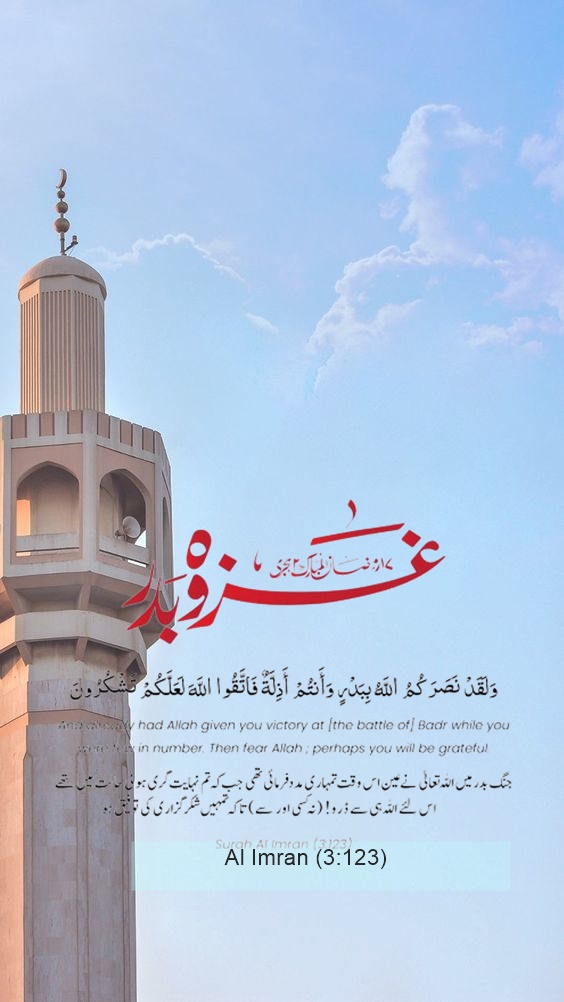Battle of Badr or Ghazwa e Badr (The great islamic Battle)
What is Ghazwa ?
In Islamic history, the term “Ghazawa” denotes the battle in which the Prophet Muhammad (PBUH) personally took part. These battles were instrumental in the establishment and spread of Islam. Below is a detailed account of some of the most significant Ghazawa:

The Battle of Badr: A Defining Moment in Islamic History
One of the greatest miracles from the time of the Prophet (sallallahu alayhi wa sallam) was the renowned Battle of Badr. After enduring years of persecution by the Quraysh, the Muslims were commanded to fight in self-defense. This battle occurred on the 17th day of Ramadan. Its significance is underscored by the fact that Allah mentioned it in the Qur’an, giving it the special name (Al Furqan) “The Day of Distinguishing.” Allah says:
‘If you believe in Allah and what We sent down to Our servant on the Day of Distinguishing, the day the two hosts met.’ (8:41)
The Battle of Badr was a crucial conflict in the early days of Islam and a turning point in Prophet Muhammad’s (S.A.W.) struggle against the disbelievers in Mecca.It is one of the rare battles specifically mentioned in the Quran.
When was the Battle of Badr?
On Tuesday, 13th March 624 CE, on the 17th of Ramadan, the Muslims fought the battle.
The anniversary of the date appears to shift forward approximately 11 days in the Gregorian calendar each year, as the Islamic calendar operates on the lunar cycle.
The Tensions Between the Muslims and the Quraysh Tribe
Background of The Battle of Badr
In the lead up to the Battle of Badr, tensions between the Muslims and Quraysh tribe of Mecca were rife.
The Muslims had made Hijrah (emigration) and settled in Medina in 622. Following intense persecution by the Quraysh tribe in Mecca, including being prohibited from performing worship.The Muslims were invited to create a new life in the settlement of Yathrib (now Medina).
Ghazwa Badr in Surah Anfal
.(11)إِذْ يُغَشِّيكُمُ النُّعَاسَ أَمَنَةً مِنْهُ وَيُنَزِّلُ عَلَيْكُمْ مِنَ السَّمَاءِ مَاءً لِيُطَهِّرَكُمْ بِهِ وَيُذْهِبَ عَنْكُمْ رِجْزَ الشَّيْطَانِ وَلِيَرْبِطَ عَلَىٰ قُلُوبِكُمْ وَيُثَبِّتَ بِهِ الْأَقْدَامَ
(Remember) when He made the slumber fall upon you as a security from Him and sent down water from the sky upon you to purify you with it and take away from you the uncleanness of Satan and to fortify your hearts, and to steady (your) footsteps thereby.
At the onset of the Battle of Badr, the enemy initially controlled the wells of drinking water. Which causing fear among the Muslims. However, rain soon fell, firming the ground beneath their feet and giving them confidence. This event may illustrate the Qur’anic phrase “to steady your footsteps”. This signifying perseverance rather than just stable footing on rain-soaked land.
During the battle, the ability to sleep is a great blessing from Allah. It not only alleviates fatigue but also prevents the enemy from launching a surprise attack. By Allah’s will, a warrior can experience a calm and restful sleep even when facing a heavily armed enemy. Conversely, without Allah’s favor, restful sleep might be impossible even in the most tranquil gardens.
The Events of the Battle of Badr
The Historic Victory of the Battle of Badr
The Battle of Badr is regarded as one of the greatest and most decisive military victories in Islamic history and world events. It took place during the month of Ramadan and is notable for the miracle that Muslims believe occurred during the battle. Despite being vastly outnumbered by the Quraysh tribe’s army of approximately 1,000 men, including 100 horses, the Muslims, with only 300 men and just two horses, managed to achieve a remarkable victory. It seemed certain that the overwhelming Quraysh forces would easily defeat the Muslim army, but the outcome defied all expectations.
The Muslims’ Raid on Quraysh Caravans and the Role of Abu Sufyān”
In the lead-up to the battle, the Prophet Muhammad (peace be upon him) and Allah had sanctioned the Muslims to raid Quraysh merchant caravans traveling past Medina as a response to the aggression and persecution they faced. The Quraysh regularly sent spies to keep track of the Muslims’ activities in Medina. And learned that the Muslims were preparing to intercept the caravan of Abu Sufyān, a key figure in the persecution against them.
The Anticipated Victory of the Quraysh
Ultimately, both sides assembled their forces and confronted each other on the battlefield, with the Quraysh seemingly poised for an easy victory.
The Battle of Badr is mentioned in the following Quranic verses:
وَلَقَدۡ نَصَرَكُمُ اللّٰهُ بِبَدۡرٍ وَّاَنۡـتُمۡ اَذِلَّةٌ ۚ فَاتَّقُوا اللّٰهَ لَعَلَّكُمۡ تَشۡكُرُوۡنَ ١٢٣
